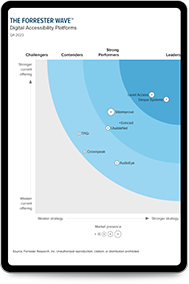DOJ Reinforces its Stance: ADA Applies to the Digital World
Dec 2, 2021
The U.S. Department of Justice (DOJ) has resumed enforcing digital accessibility with a settlement with Rite Aid announced on November 1, 2021.
The DOJ took action because the portal was not accessible to some people with disabilities, including those with vision impairments and mobility issues.The settlement means Rite Aid’s COVID-19 Vaccine Registration Portal will be made accessible so every visitor to the site can obtain information about COVID-19 vaccinations and book their vaccination appointments online. Two examples of inaccessible components cited in the DOJ press release were 1) the calendar on Rite Aid’s website used for scheduling vaccine appointments did not show screen reader users any available appointment times, and 2) people who use keyboard navigation instead of a mouse could not make a choice on a consent form that they needed to fill out before scheduling their appointment.
Referencing WCAG 2.1 AA
What’s noteworthy about this decision, as opposed to DOJ enforcement actions in years past, is the DOJ’s usage of the new version of the Web Content Accessibility Guidelines—WCAG 2.1 AA—as its benchmark for accessibility, as opposed to the older WCAG 2.0 AA. The DOJ also drew upon requirements in previous website accessibility cases to ensure Rite Aid’s offerings not only become compliant but maintain compliance with the Americans with Disabilities Act (ADA).Additional settlement requirements include:
- Website accessibility notice and feedback: Rite Aid needs to update its “Accessibility” page to add information regarding commitment to the accessibility of vaccine content and provide both an email and phone number (with video relay services) where customers can get help and provide feedback.
- Automated website accessibility testing: Rite Aid shall continue using an automated accessibility testing tool to assist in evaluating, assessing, and developing accessible content and components.
- Website accessibility consultant and evaluation: Rite Aid shall continue to retain its current website accessibility consultant to advise on how to comply with its obligations as well as provide audit reports.
- Website accessibility training: Rite Aid must provide training to all employees involved in the design, development, maintenance, and/or management of the vaccine content.
- Recordkeeping and reporting: Rite Aid shall submit reports of the audit results and compliance efforts.
A similar settlement
Similar to the Rite Aid case, the DOJ also recently secured a settlement agreement with Hy-Vee Supermarket Chain. That suit claimed its COVID-19 vaccination registration portal was also not accessible to individuals with disabilities, including those who use a screen reader or those who have difficulty using a mouse to navigate the website. Under the settlement, Hy-Vee will make content about the COVID-19 vaccine, as well as the forms used to schedule an appointment to get the vaccine, conform with WCAG 2.1 AA standards. Hy-Vee is also required to regularly test the pages of its website and quickly fix any problems that create barriers for people with disabilities.
The ADA applies to digital properties
Although the DOJ has not published new regulations for digital accessibility, these settlements highlight its stance: as the enforcement and regulatory agency for Title II and Title III of the ADA, the DOJ believes the ADA applies to the digital world.In a DOJ press release about the Hy-VEE settlement, the Assistant Attorney General of the Justice Department’s Civil Rights Division, Kristen Clarke reinforced this stance, saying,“Ensuring that people with disabilities can schedule COVID-19 vaccination appointments the same way that people without disabilities can is not only a public health necessity, but a key civil rights issue under the Americans with Disabilities Act.”The Rite Aid settlement requirements also serve as best practices for organizations that are proactively working to become ADA compliant.
eSSENTIAL Accessibility can help
So what do these recent settlements mean for you? If your digital experience is not accessible for individuals with disabilities, case law trending is clear: you are at risk of an ADA lawsuit. But eSSENTIAL Accessibility will work with you to achieve compliance, making your digital experiences accessible—whether they include a website, mobile app, digital product, software, or a combination. Our Accessibility-as-a-Service approach combines automation, manual testing, tools, training, and legal support, in a fixed-fee pricing model. Request a demo today.
Subscribe for updates

